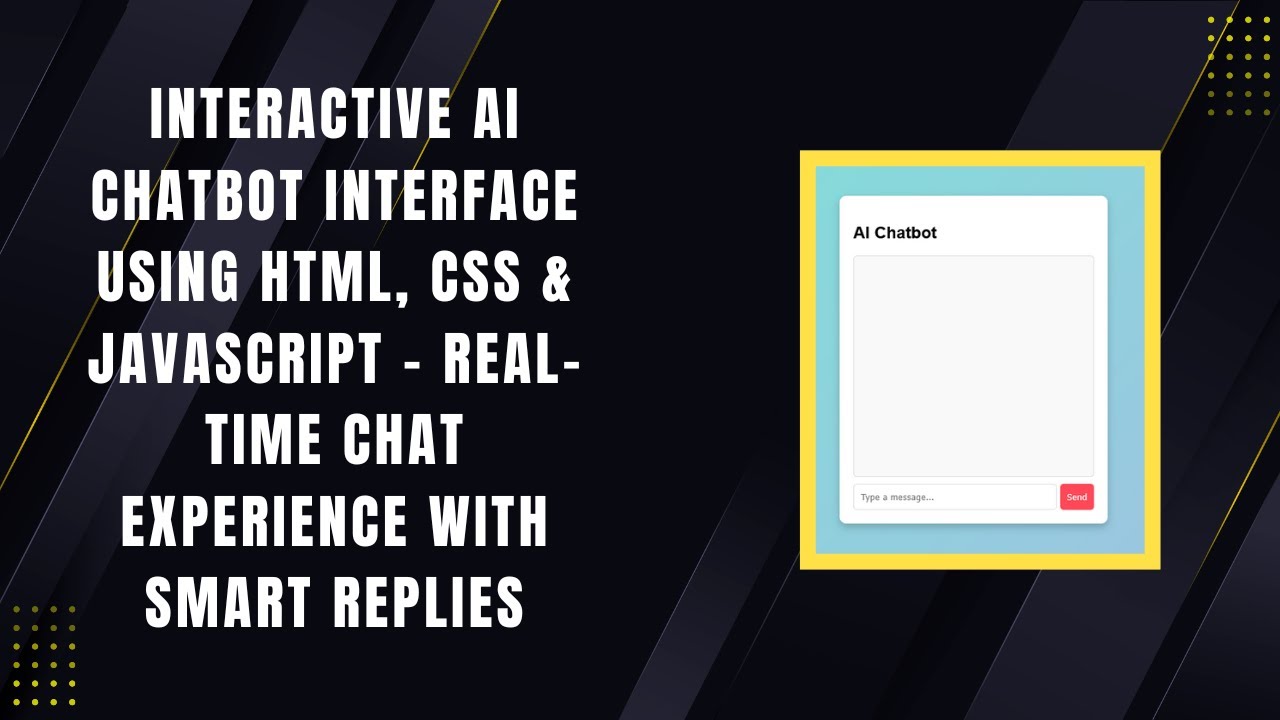In this guide, we’ll walk through creating an engaging AI chatbot interface using HTML, CSS, and JavaScript. You’ll learn how to design a user-friendly chat layout, handle user input, and simulate AI-like responses for a seamless, interactive experience.
Features of the AI Chatbot
✅ Modern chat UI with HTML and CSS 🎨
✅ Handling user input dynamically with JavaScript ⚡
✅ AI-like chatbot responses 🤖
✅ Smooth scrolling and animations ✨
✅ Responsive design for a better user experience 🖥️
Step 1: HTML Structure
We start by creating the basic HTML layout for our chatbot interface:
<!DOCTYPE html>
<html lang="en">
<head>
<meta charset="UTF-8">
<meta name="viewport" content="width=device-width, initial-scale=1.0">
<title>AI Chatbot Interface</title>
</head>
<body>
<div class="chat-container">
<h2>AI Chatbot</h2>
<div class="chat-box" id="chatBox"></div>
<div class="input-container">
<input type="text" id="userInput" placeholder="Type a message..." onkeypress="handleKeyPress(event)">
<button onclick="sendMessage()">Send</button>
</div>
</div>
</body>
</html>This creates a chatbox, an input field, and a button for sending messages.
Step 2: Styling with CSS
To make our chatbot visually appealing, we add the following CSS:
body {
font-family: Arial, sans-serif;
display: flex;
justify-content: center;
align-items: center;
height: 100vh;
background: linear-gradient(135deg, #74ebd5, #acb6e5);
margin: 0;
}
.chat-container {
width: 350px;
background: white;
padding: 20px;
border-radius: 10px;
box-shadow: 0px 5px 10px rgba(0, 0, 0, 0.2);
display: flex;
flex-direction: column;
}
.chat-box {
height: 300px;
overflow-y: auto;
padding: 10px;
border: 1px solid #ddd;
border-radius: 5px;
background: #f9f9f9;
display: flex;
flex-direction: column;
}
.message {
padding: 8px 12px;
border-radius: 10px;
margin: 5px 0;
max-width: 80%;
}
.user {
background: #ff4757;
color: white;
align-self: flex-end;
}
.bot {
background: #3498db;
color: white;
align-self: flex-start;
}
.input-container {
display: flex;
margin-top: 10px;
}
input {
flex: 1;
padding: 10px;
border: 1px solid #ddd;
border-radius: 5px;
outline: none;
}
button {
background: #ff4757;
color: white;
border: none;
padding: 10px;
margin-left: 5px;
border-radius: 5px;
cursor: pointer;
}
button:hover {
background: #e84118;
}Step 3: JavaScript for Chatbot Logic
Now, let’s add JavaScript to handle user input and bot responses:
function sendMessage() {
let userInput = document.getElementById("userInput").value.trim();
if (userInput === "") return;
addMessage(userInput, "user");
document.getElementById("userInput").value = "";
setTimeout(() => {
let botResponse = getBotResponse(userInput);
addMessage(botResponse, "bot");
}, 1000);
}
function addMessage(text, sender) {
let chatBox = document.getElementById("chatBox");
let messageDiv = document.createElement("div");
messageDiv.classList.add("message", sender);
messageDiv.innerText = text;
chatBox.appendChild(messageDiv);
chatBox.scrollTop = chatBox.scrollHeight;
}
function getBotResponse(input) {
input = input.toLowerCase();
const responses = {
"hi": "Hello! How can I help you?",
"hello": "Hi there! What do you need?",
"how are you": "I'm just a bot, but I'm doing great! 😊",
"what is your name": "I'm ChatBot, your AI assistant!",
"bye": "Goodbye! Have a great day!",
"thanks": "You're welcome! 😊"
};
return responses[input] || "Sorry, I didn't understand that. Can you rephrase?";
}
function handleKeyPress(event) {
if (event.key === "Enter") {
sendMessage();
}
}Demo Video 📺
Check out the step-by-step tutorial in this video:
Conclusion
By following this guide, you’ve built a fully functional AI chatbot using HTML, CSS, and JavaScript. This project is a great starting point for creating more advanced chatbots with AI-powered responses.
Want More?
🔗 GitHub Repository
📢 Like, Share & Subscribe to Madras Academy for more coding tutorials! 🚀

